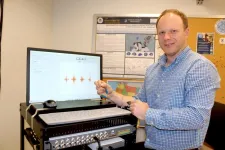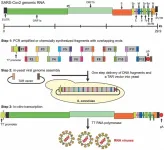(Press-News.org) Every year, about 800,000 new stroke cases are reported in the United States, often causing patients problems with both neurological and physical motor control. Disruptions in the mobility of the arms and hands, in particular, can have devastating impacts on stroke patients’ quality of life.
The restoration of arm extremity and hand dexterity are often the highest priority among stroke patients. A new robotic platform developed at the University of Rhode Island, which utilizes both a patient’s brainwaves and muscle activity, aims to help post-stroke patients perform needed rehabilitation and regain critical motor skills, including complex tasks like reaching and grasping for an object.
Mariusz Furmanek, assistant professor of physical therapy and PI of the URI Motor Control and Rehabilitation Lab, is working with engineering professors Reza Abiri and Yalda Shahriari on the assistive planar robot, which includes a cutting-edge closed-loop feedback system to monitor the muscle and brain activity of the user in order to trigger the execution of reach and grab in an adaptive way.
“Numerous rehabilitation approaches such as muscular electrical stimulations, brain-computer interfaces, and transcranial magnetic stimulation have been investigated to assist the affected individuals. Only sparse research has been conducted to show the efficacy of assistive planar robots in offering affordable independent solutions to address this demand,” the researchers write in a study summary, which is supported by a $460,000 award from the National Science Foundation’s Disability and Rehabilitation Engineering program. “Designing and developing such robots with satisfactory rehabilitative outcomes could be crucial for high demand tasks such as repetitive motor training as intervention in the early stage of stroke.”
The project, which aims to make significant strides in rehabilitation methodologies, will advance the rehabilitation of upper-extremity motor functions for post-stroke patients. User-generated feedback will tailor the device to each user. The use for post-stroke patients could be immediate. Users will be able to more quickly recover neural plasticity, improving their brain capacity to continue growing and evolving, adapting and changing through the creation of new neurons and networks. The user-centered robotic device can also provide occupational therapy in the patient’s own home. Having a device at home, outside of the clinical setting, would mean more integration into daily life and more physical therapy for patients.
“Through cutting-edge technology, we envision a transformative impact on the rehabilitation journey for post-stroke individuals,” Furmanek said. “The project focuses on developing a user-friendly wearable exoskeleton for adaptive assistance. Through a portable robotic training platform, we aim to overcome barriers, accelerate recovery, and advance the understanding of poststroke upper arm extremity rehabilitation.”
The researchers are also working with and consulting with stroke specialist and Massachusetts General Hospital neurologist David Lin. In the future, the technology could be used for patients with other categories or neurological diseases.
“Despite technological advancements, the intricate nature of the brain poses a significant challenge,” Furmanek said. “Neuroscience remains one of the frontiers due to numerous fundamental questions that await answers.”
END
Robotic rehab aims to help stroke patients regain hand dexterity
Research in University of Rhode Island Motor Control and Rehabilitation lab funded by $460,000 grant from National Science Foundation
2024-01-08
ELSE PRESS RELEASES FROM THIS DATE:
Illinois Tech launches sensor technology program with emphasis on veteran education
2024-01-08
CHICAGO—January 8, 2023—Illinois Institute of Technology (Illinois Tech) has received a substantial grant from the National Science Foundation (NSF) to launch a pioneering education program in sensory technology aimed at underrepresented groups—particularly veterans. The initiative, funded through NSF’s Experiential Learning for Emerging and Novel Technologies (ExLENT) program, underscores Illinois Tech’s commitment to critical future technologies and expanding education to groups that have historically ...
Study highlights barriers to contraceptive access for disabled Medicare enrollees
2024-01-08
PITTSBURGH — Contraceptive use is low among reproductive-aged people with disabilities who are enrolled in Medicare, according to a new study from the University of Pittsburgh that highlights how lack of contraceptive coverage by Medicare may prevent disabled enrollees from accessing contraception.
Published today in the January issue of Health Affairs, the study provides the first national overview of contraceptive use among enrollees in Medicare, the government health insurance for people over 65 and for people with qualifying disabilities. ...
Study of national data demonstrates the value of acute hospital care at home
2024-01-08
Since the Centers for Medicare and Medicaid Services launched the Acute Hospital Care at Home (AHCaH) Waiver in 2020, thousands of patients from across 300 hospitals in 37 states have been treated in their homes. Yet little is understood about these patients’ outcomes on a national level, and the waiver will end in December 2024 unless there is an act from Congress. A new study by investigators from Mass General Brigham analyzed outcomes from AHCaH for a diverse group of patients across America. The study provides preliminary evidence suggesting that home hospital ...
Hospital care at home benefits medically complex, socially vulnerable patients
2024-01-08
Embargoed for release until 5:00 p.m. ET on Monday 8 January 2024
Annals of Internal Medicine Tip Sheet
@Annalsofim
Below please find summaries of new articles that will be published in the next issue of Annals of Internal Medicine. The summaries are not intended to substitute for the full articles as a source of information. This information is under strict embargo and by taking it into possession, media representatives are committing to the terms of the embargo not only on their ...
Real-world analysis: COVID-19 vaccine strongly effective for children and adolescents during delta and omicron
2024-01-08
Children and adolescents who received one of the main COVID-19 vaccines were significantly protected from the illness and showed no increased signs of cardiac complications compared to young people who were not vaccinated, according to a new real-world study led by researchers from the Perelman School of Medicine at the University of Pennsylvania and Children’s Hospital of Philadelphia (CHOP). When the Delta variant rose to prominence, the study showed that vaccinated young people were 98 percent less likely to be infected than their unvaccinated peers, and ...
Studying cells to improve medulloblastoma treatment
2024-01-08
Research is shedding light and potentially expanding options for patients living with Medulloblastoma, an aggressive childhood cancer.
Medulloblastoma is a cancer impacting both very young and school aged children.
When children get this type of brain tumor, they experience the process of the tumor blocking flow of fluid around the brain.
This can cause severe headaches, vomiting, sleepiness, fussiness, and difficulty walking and coordinating movements.
Treatment is intense, involving high dose chemotherapy, surgery, and sometimes radiation or stem cell transplants.
During these months long treatments, children may lose ...
Residential addiction treatment for U.S. teens is scarce, expensive
2024-01-08
Despite an alarming increase in overdose deaths among young people nationwide, a new “secret shopper”-style study led by Oregon Health & Science University researchers finds that access to residential addiction treatment centers for adolescents in the United States is limited and costly.
The study, published today in the January issue of the journal Health Affairs, found that about half of the sites reported a wait time, and among those the average wait was almost a month. For those who do manage to find a placement, the average daily cost is $878 — with close to half of the facilities that provided information requiring partial or full payment upfront. For the average ...
Residential addiction treatment for adolescents is scarce and expensive
2024-01-08
Access to residential addiction treatment centers caring for U.S. adolescents under 18 years old in the United States is limited and costly, according to a new study supported by the National Institutes of Health. Researchers found that only about half (54%) of the residential addiction treatment facilities that they contacted had a bed immediately available, and for those that had a waitlist, the average estimated time before a bed opened was 28 days. In addition, the average daily cost per day of treatment was $878, with close to half (48%) of the facilities that provided information requiring partial or full payment upfront. ...
Transformation-associated recombination (TAR) cloning and its applications
2024-01-08
“TAR cloning is used to genetically engineer synthetic viruses with novel properties that may be used for the development of new vaccines.”
BUFFALO, NY- January 8, 2024 – A new review paper was published in Oncotarget's Volume 14 on December 22, 2023, entitled, “Transformation-associated recombination (TAR) cloning and its applications for gene function; genome architecture and evolution; biotechnology and biomedicine.”
Transformation-associated recombination (TAR) cloning represents a unique tool to selectively and efficiently recover a given chromosomal segment up to several hundred ...
Slow the scroll: Users less vigilant about misinformation on mobile phones
2024-01-08
UNIVERSITY PARK, Pa. — Mobile phones pack a lot of information into pocket-sized devices, which is why users may want to slow down the next time they’re scrolling through social media or checking email on a mobile app. People process information more efficiently but tend to be less vigilant about misinformation on their mobile phones compared to personal computers (PCs), according to a team led by Penn State researchers. This is especially true for users who have developed a routine or habit of using their ...
LAST 30 PRESS RELEASES:
Asteroid samples offer new insights into conditions when the solar system formed
Fecal transplants from older mice significantly improve ovarian function and fertility in younger mice
Delight for diastereomer production: A novel strategy for organic chemistry
Permafrost is key to carbon storage. That makes northern wildfires even more dangerous
Hairdressers could be a secret weapon in tackling climate change, new research finds
Genetic risk for mental illness is far less disorder-specific than clinicians have assumed, massive Swedish study reveals
A therapeutic target that would curb the spread of coronaviruses has been identified
Modern twist on wildfire management methods found also to have a bonus feature that protects water supplies
AI enables defect-aware prediction of metal 3D-printed part quality
Miniscule fossil discovery reveals fresh clues into the evolution of the earliest-known relative of all primates
World Water Day 2026: Applied Microbiology International to hold Gender Equality and Water webinar
The unprecedented transformation in energy: The Third Energy Revolution toward carbon neutrality
Building on the far side: AI analysis suggests sturdier foundation for future lunar bases
Far-field superresolution imaging via k-space superoscillation
10 Years, 70% shift: Wastewater upgrades quietly transform river microbiomes
Why does chronic back pain make everyday sounds feel harsher? Brain imaging study points to a treatable cause
Video messaging effectiveness depends on quality of streaming experience, research shows
Introducing the “bloom” cycle, or why plants are not stupid
The Lancet Oncology: Breast cancer remains the most common cancer among women worldwide, with annual cases expected to reach over 3.5 million by 2050
Improve education and transitional support for autistic people to prevent death by suicide, say experts
GLP-1 drugs like Ozempic could cut risk of major heart complications after heart attack, study finds
Study finds Earth may have twice as many vertebrate species as previously thought
NYU Langone orthopedic surgeons present latest clinical findings and research at AAOS 2026
New journal highlights how artificial intelligence can help solve global environmental crises
Study identifies three diverging global AI pathways shaping the future of technology and governance
Machine learning advances non targeted detection of environmental pollutants
ACP advises all adults 75 or older get a protein subunit RSV vaccine
New study finds earliest evidence of big land predators hunting plant-eaters
Newer groundwater associated with higher risk of Parkinson’s disease
New study identifies growth hormone receptor as possible target to improve lung cancer treatment
[Press-News.org] Robotic rehab aims to help stroke patients regain hand dexterityResearch in University of Rhode Island Motor Control and Rehabilitation lab funded by $460,000 grant from National Science Foundation



